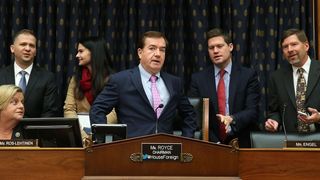Congressman Ed Royce, the 66 year-old chairman of the US House Foreign Affairs Committee, yesterday announced that he would not seek a 14th two-year term at the 2018 midterm elections.
There is widespread speculation that Royce retired rather than facing a potentially challenging re-election campaign in California’s 39th Congressional district, which includes parts of Los Angeles and Orange County. Democrats were eyeing Royce’s seat as a pickup opportunity in this November’s midterm elections, especially as Hillary Clinton defeated Donald Trump by almost 9 points in the district in 2016. But many of the other fundamentals were in Royce’s favour: he beat his Democratic opponent by 15 points in 2016, had the advantage of incumbency, and $3.5 million on hand in his campaign account last September. Just half an hour before Royce issued his statement of resignation, the White House officially nominated his wife Marie Royce to be assistant secretary of state for educational and cultural affairs, a post that would require her to be based in Washington if the Senate approves her candidacy.
Regardless of the reasons for Royce’s departure, it is perhaps the most important of a spate of more than 30 House Republicans who have announced they are retiring, running for another office or resigning prior to the midterms. Although many outgoing Republicans represent safe districts, there is little doubt that the national political climate is a significant factor: Donald Trump’s historically low approval ratings, potential primary challenges from Republican opponents, and the likely swing away from the president’s party – and therefore towards Democrats – would have loomed large for Royce and many of his colleagues. These Republican departures favour Democrats, because it is much easier to win an ‘open’ seat than run against an incumbent.
With both Royce and his Senate counterpart Bob Corker set to retire at the midterms, the nature of both the House and Senate foreign affairs committees’ interventions in US foreign policy through 2018 could change.
Royce has used his chairmanship over the past five years to advance hawkish foreign policy views, especially towards North Korea, but also Iran and Russia, and will retain the gavel throughout 2018. Without the pressure of a re-election campaign, he will likely have more time to dedicate to the foreign policy portfolio and promised to do just that in his statement. North Korea will loom large for Royce this year, due to its escalating nuclear and missile capabilities, as well as the fact that Royce has had a longstanding interest in DPRK issues that owes in part to the sizeable Korean-American population in his district. Another key issue is the Iran nuclear deal; Royce has urged President Trump to ‘enforce the hell’ out of the deal rather than abandoning it, despite his own hawkish views on Iran and consistent support for Israel alongside Eliot Engel, the ranking Democrat on the committee.
With both Royce and his Senate counterpart Bob Corker set to retire at the midterms, the nature of both the House and Senate foreign affairs committees’ interventions in US foreign policy through 2018 could change. Unburdened by electoral imperatives, Royce and Corker will be freer to advance their relatively traditional Republican policy positions both individually and through their committees.
Finally, it will be important for the Australian Embassy in Washington and senior Australian politicians to build links with senior Republicans and Democrats who could assume the chairmanship in 2019, pending the outcome of the midterm elections. Democratic Representative Engel and Senator Ben Cardin are set to take these positions should their party regain the relevant chamber, on the Republican side the respective front-runners are Homeland Security Chairman Michael McCaul and Senator Jim Risch, the second-ranking senator on the Foreign Relations committee.
Personnel matters, and few positions on Capitol Hill are more important to Australia than the chairs of the House and Senate foreign affairs committees.






